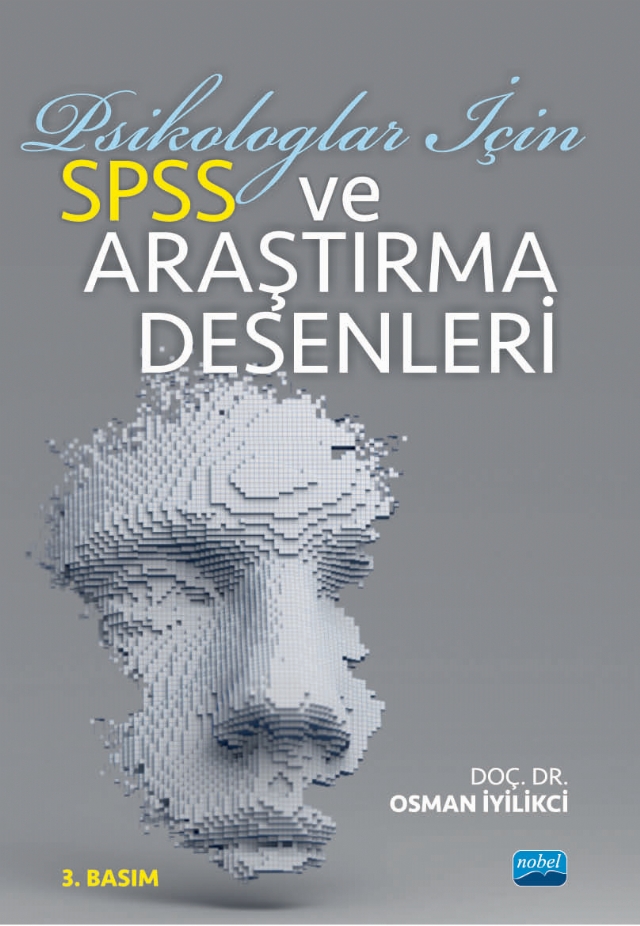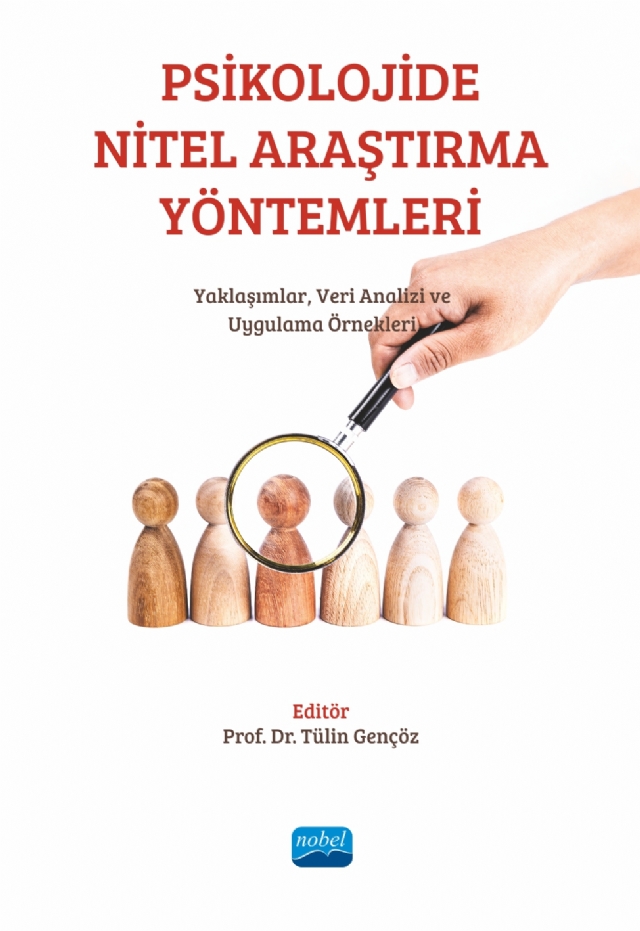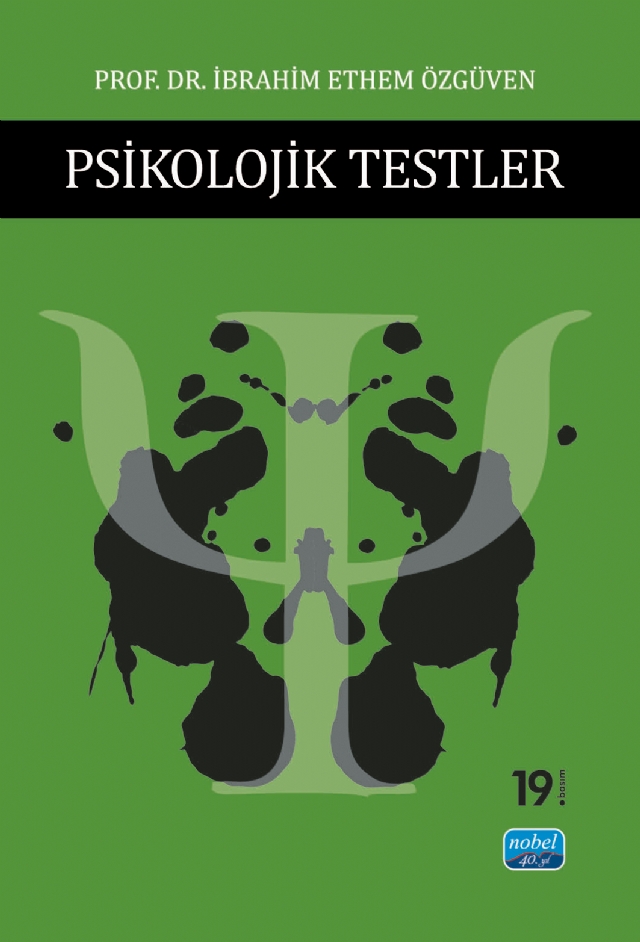Experimental Psychology and Psychometry \ 1-1

Quantitative data analysis is an important part of scientific research methods in psychology. One of the consequences of this situation is that the research design used during scientific studies in psychology determines which technique will be used to analyze the data obtained. From this point of view, all statistical analyzes in this book are handled together with the research design and measurement level they are related to.
The research examples and the topics covered in the book have been determined in accordance with the terminology that psychologists encounter in research methods, statistics and experimental psychology courses throughout their education. In order to increase clarity, the statistical analyzes in the book are handled through sample data files that the reader can download from the relevant web page. In addition, each analysis is supported by an example of an APA style report.
Considering the topics it covers, it is thought that the book is suitable both for those who are just starting to use SPSS and for researchers with SPSS experience. Therefore, the book is a helpful resource for both students and researchers in scientific research projects, research methods courses, and computer-applied statistics courses.
The research examples and the topics covered in the book have been determined in accordance with the terminology that psychologists encounter in research methods, statistics and experimental psychology courses throughout their education. In order to increase clarity, the statistical analyzes in the book are handled through sample data files that the reader can download from the relevant web page. In addition, each analysis is supported by an example of an APA style report.
Considering the topics it covers, it is thought that the book is suitable both for those who are just starting to use SPSS and for researchers with SPSS experience. Therefore, the book is a helpful resource for both students and researchers in scientific research projects, research methods courses, and computer-applied statistics courses.

"This book; It consists of studies that uniquely address issues that have emerged as a result of several centuries of theoretical and empirical discoveries, contradictions and even tides in the history of psychology. The articles in the book show how wide the conceptualization level of psychology is, from the gene/environment interaction that largely determines our lives to the perception in the social environment. In addition, the book covers techniques ranging from animal models to MRI and EEG, and explains how and why psychology research has benefited from these methods. Apart from this scope and original content, another aspect that makes this book valuable is that it is in Turkish. Unfortunately, the dominance of English and its universality as the language of science brings with it the publication and dissemination of most of the researches in this language. Although the existence and prevalence of a lingua franca is important because it enables all scientists in the world to agree with each other, it is obvious that Turkish must be a scientific language and a means of communication. For this reason, I hope that this book will be an encouraging factor for young scientists to bring their ideas and products into our language.”
Reşit Canbeyli
Bogazici University
Reşit Canbeyli
Bogazici University

Social science studies, whose focus is human, focus on how individuals make sense of events, interpret them and how they are affected by them. Qualitative research methods are one of the most effective ways to study this subject in depth.
Qualitative research methods are very important scientific research methods that have been preferred more frequently by researchers in recent times, both in terms of working directly with the person in their own language and not denying the potential effect of the researcher on the process. In qualitative studies, the goal is not to determine the truth or falsity of predetermined hypotheses, but to gather in-depth information about why and how experiences affect individuals. Within the framework of this basic stance, qualitative research has different methods, and each method has its own goal and analysis methodology. In this book, these methods are presented to the reader in detail in different chapters, by dealing with all the subtleties within the framework of both the purpose of the research and the ways to be followed according to the method used, and exemplified within the framework of studies in the field of psychology.
Qualitative research methods are very important scientific research methods that have been preferred more frequently by researchers in recent times, both in terms of working directly with the person in their own language and not denying the potential effect of the researcher on the process. In qualitative studies, the goal is not to determine the truth or falsity of predetermined hypotheses, but to gather in-depth information about why and how experiences affect individuals. Within the framework of this basic stance, qualitative research has different methods, and each method has its own goal and analysis methodology. In this book, these methods are presented to the reader in detail in different chapters, by dealing with all the subtleties within the framework of both the purpose of the research and the ways to be followed according to the method used, and exemplified within the framework of studies in the field of psychology.

Parallel to the developments in the world, "psychological tests" in our country started as a "translation" movement of tests developed in other countries at the beginning of the current century, and there was no development effort and effort on the tests. In today's sense, writing, testing, applying, doing item analysis, choosing good questions and preparing the posttest, and conducting validity and reliability studies started in the mid-1950s. In the period since the 1950s, important institutions have been established in the fields of measurement technique, psychological tests and test development in our country.
Increasing demand for tests; It has enabled the rapid development of psychology and the branch of psychological tests in our country compared to other branches. Psychological Tests book; He focused on "test development", "appropriate use of psychological tests and appropriate interpretation of the obtained scores", "introducing psychological tests, especially those found in our country".
This book is about psychological tests in undergraduate and partially graduate programs applied in psychology, psychological counseling, psychiatry, assessment and evaluation, program development, child development and education, vocational and technical education, special education, classroom teaching, social services and other related departments of universities. It has been prepared as a “textbook” that can be read.
Increasing demand for tests; It has enabled the rapid development of psychology and the branch of psychological tests in our country compared to other branches. Psychological Tests book; He focused on "test development", "appropriate use of psychological tests and appropriate interpretation of the obtained scores", "introducing psychological tests, especially those found in our country".
This book is about psychological tests in undergraduate and partially graduate programs applied in psychology, psychological counseling, psychiatry, assessment and evaluation, program development, child development and education, vocational and technical education, special education, classroom teaching, social services and other related departments of universities. It has been prepared as a “textbook” that can be read.

Since you have started to read this book, we can assume that you have an interest and curiosity in psychology. Psychology attracts the attention of almost everyone at some point because it tries to explain the "me" as a human being. Some want to understand themselves, some their partner, their boss, some their children and some their parents. In other words, the effort to understand people and ourselves in the first place leads us to learn psychology. As in the verses of the famous folk poet of Anatolia, Yunus Emre, which are rosewood in our language, "Science is knowledge, knowledge is knowing yourself, if you do not know yourself, it is a lot of reading".
However, this self-knowledge, self-learning, self-discovery can often turn into a toy in the hands of those who turn science into a profit for their own interests. As a matter of fact, not understanding psychology correctly "Are you reading my mind now?" It may also cause you to become the target of the question. “I am also interested in psychology.”, “We also understand psychology, I love personal development books.” Such sentences will be some of the things that those who will specialize in this field will often hear. So, is psychology really a field that anyone who is interested in can specialize in by reading a few books? I can imagine that you answered “no” to this question. Still, it can be equally dangerous to popularize psychology too much and push it away from science, leaving it only in the hands of scientists and making it elitist. Because science will only be useful as long as it reaches people and continues to develop like a living organism in life.
The science of psychology was shaped centuries ago by the answers given by philosophers to the questions they asked to understand human, and then it was born as a science on the basis of physiological studies. Psychology continues to keep our curiosity alive today, with hundreds of theories and millions of concepts written about it.
However, this self-knowledge, self-learning, self-discovery can often turn into a toy in the hands of those who turn science into a profit for their own interests. As a matter of fact, not understanding psychology correctly "Are you reading my mind now?" It may also cause you to become the target of the question. “I am also interested in psychology.”, “We also understand psychology, I love personal development books.” Such sentences will be some of the things that those who will specialize in this field will often hear. So, is psychology really a field that anyone who is interested in can specialize in by reading a few books? I can imagine that you answered “no” to this question. Still, it can be equally dangerous to popularize psychology too much and push it away from science, leaving it only in the hands of scientists and making it elitist. Because science will only be useful as long as it reaches people and continues to develop like a living organism in life.
The science of psychology was shaped centuries ago by the answers given by philosophers to the questions they asked to understand human, and then it was born as a science on the basis of physiological studies. Psychology continues to keep our curiosity alive today, with hundreds of theories and millions of concepts written about it.